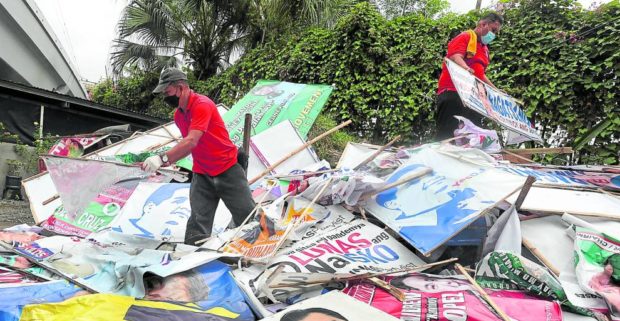Supreme Court issues TRO vs Comelec’s ‘Oplan Baklas’

VICTORY | Election lawyer Romulo Macalintal hailed the high court’s restraining order against Comelec’s “Oplan Baklas” as a “victory” for candidates who largely depend on supporters and volunteers for their electoral campaign. (MARIANNE BERMUDEZ / PHILIPPINE DAILY INQUIRER)
MANILA, Philippines — The Supreme Court has issued a temporary restraining order (TRO) on the Commission on Elections (Comelec), directing the poll body to desist from further removing campaign materials put up by private citizens in their properties, while the high court is hearing the case against the Comelec’s actions under its “Oplan Baklas” operation.
The full court issued the TRO on Tuesday, a week after supporters of Vice President Leni Robredo, a presidential candidate, petitioned the court on March 1 to stop that operation.
The petitioners were led by St. Anthony College of Roxas City and volunteer groups Isabela for Leni and Zamboangeños for Leni.
On Feb. 16, a week into the official campaign period for national candidates, the Comelec began a virtual crackdown on what it deemed to be prohibited campaign posters due to their sizes.
But this policy drew flak for targeting not only election materials in private properties but also, as it has been observed, posters, billboards, and other visual representations of Robredo and her running mate, Sen. Francis “Kiko” Pangilinan.
Article continues after this advertisementBesides the Comelec, personnel of the Metropolitan Manila Development Authority, together with the police and barangay officials, would lead the dismantling of election materials that residents supporting the Robredo installed in their own homes.
Article continues after this advertisementIn Isabela province, police and fire personnel dismantled campaign materials put up by Robredo’s supporters, while an election official repainted a mural of the Robredo-Pangilinan tandem while being guarded by heavily armed police.
The mural was on a wall of a private compound along the main highway in Echague town.
The poll body, in response, said it had the authority to remove or dismantle what it saw as unlawful election materials, including those on private property.
Comelec spokesperson James Jimenez also challenged those questioning Oplan Baklas to file a complaint or take this matter to court.
Provisions under question
In their 52-page urgent petition for certiorari, prohibition, and mandamus, the petitioners noted that the materials being taken down were “privately owned and privately funded solely by volunteers and private citizens….”
The petitioners challenged three provisions of Comelec Resolution No. 10730 issued on Nov. 17, 2021, regarding allowable election campaign materials.
One provision was Section 21 (o), which allowed campaign materials to be put up outside so-called common poster areas and in properties with the owner’s consent, but limited the size of the posters to 2 feet by 3 feet.
The petitioners also questioned Section 24, which limited a signboard in campaign headquarters to 3 feet by 8 feet; and Section 26, which said the Comelec may, on its own, order the removal of campaign materials considered prohibited or illegal.
The high court gave the poll body 10 days upon receipt of the TRO to submit its reply.
‘Noncandidates’
Last week the country’s national organization of lawyers said the Comelec cannot apply its regulations on residents putting up campaign materials in their properties.
The Integrated Bar of the Philippines (IBP) invoked a 2015 ruling on Diocese of Bacolod v. Comelec which said the regulation of election propaganda only applies to candidates, political parties, and party-list groups.
“There are no existing bright lines to categorize speech as election-related and those that are not,” the decision said in part.
“Since the dismantled posters, voluntarily posted by noncandidates at their own instance, are not election propaganda regulated by law, it goes without saying that the Comelec cannot overzealously subject them to the 2 feet by 3 feet restriction for candidates in the guise of ensuring equal opportunity among candidates,” the IBP said.
Election lawyer Romulo Macalintal, who has been among the first to call out the Comelec for targeting election propaganda materials put up by noncandidates, welcomed the restraining order.
“This is indeed a welcome great development and victory for those candidates who do not have enough funds to sustain a nationwide campaign and who only depend upon the help and support of their volunteers,” he said in a statement.
The TRO “will certainly give poor candidates a strong fighting chance to level the playing field in the political arena since it is now the private citizens who would do their own share [to ensure] that we elect only honest and competent leaders with utmost integrity,” he added.
Macalintal thanked the Supreme Court “for coming up with such a much-needed injunction at this most opportune time to safeguard [the] people’s right [to] suffrage.”
—WITH REPORTS FROM KRIXIA SUBINGSUBING AND INQUIRER RESEARCH
RELATED STORIES
SC asked to stop ‘Oplan Baklas’ on private property
Private property owners take case vs ‘Oplan Baklas’ to Supreme Court
Advocacy materials safe from ‘Oplan Baklas,’ says Comelec exec